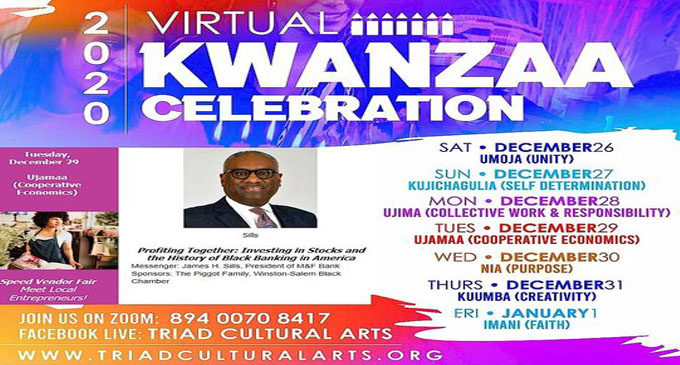Kwanzaa celebration goes virtual

Throughout the week people have been coming together virtually to celebrate the seven principles of Kwanzaa.
For over a decade Triad Cultural Arts (TCA) has hosted the annual citywide event at a different location every night of the celebration, but due to the pandemic, organizers were forced to make changes. Using Zoom and live feed to Facebook, TCA was able to continue the local tradition and celebration of Kwanzaa.
Celebrated each year from Dec. 26 – Jan. 1, Kwanzaa, which means “first fruits of harvest” in the African language Kiswahili, is an African American celebration that focuses on the traditional African values of family, community, responsibility, commerce, and self-improvement. Each day of Kwanzaa is represented by a principle or theme that serves as the focus for the celebration that day. Dr. Maulana Karenga introduced Kwanzaa in 1966.
Local festivities began on Saturday, Dec. 26, where the focus was Umoja, which means unity. The keynote speaker was Rev. Kenneth Pettigrew, chief operating officer for the Winston-Salem Urban League.
On Sunday the focus was Kujichagulia, which means “self-determination.” Annette Scippio, who represents the East Ward on the Winston-Salem City Council, was the speaker.
To celebrate Ujima or “collective work and responsibility,” on Monday organizers held a town hall where panelists discussed the recent rise in the number of violent crimes committed by teenagers. Triad Cultural Arts, Inc. and the Big 4 Alumni Association hosted a virtual open forum where individuals from all walks of life came together to discuss ways to stop the rise in violent crime, more specifically crimes involving young people.
The theme of the community conversation was Maintaining Our Community: Stemming the Tide of Youth Violence. Panelists included Bishop Todd Fulton, pastor of Mt. Moriah Outreach Center, Dr. Jesse Pratt, area superintendent with Winston-Salem/Forsyth County Schools, William Penn, assistant chief of the Winston-Salem Police Department, Frankie Gist, community activist and founder of the nonprofit Hope Dealers, and Jamisena Campbell, local activist and grandmother of a victim of senseless gun violence.
To jumpstart the conversation, moderator Dr. Kia Scott-Hood asked panelists: what role do the different entities and organizations within the community play in ensuring the safety of our young people? And although the panelists come from different walks of life, they all agreed that to make a difference we must get out of our own comfort zones and meet the children where they are.
Bishop Fulton said he believes that the “faith-based community” is out of touch with the younger generation and the only way to fix that is by getting out of the four walls of the church and getting out in the streets. “That’s challenging to say, but it’s the truth,” Fulton continued.
“Because in most of our churches, we don’t have juveniles that are in the streets. So we’re going to have to leave our places of worship … it’s going to take us not expecting these youth to come to our churches or houses of worship, but for us to leave the four walls and go to these schools to volunteer and mentor.”
When asked what the WSPD is doing to stop the violence, Assistant Chief William Penn said the department realizes that this is a problem they can’t arrest their way out of, so they have taken great strides to increase transparency and community outreach.
“Hopefully you’ve seen more of the police department involved in things traditionally we haven’t been a part of, so the book bag giveaways, the Operation Sweet Reads truck where we read books and give out ice cream … the Explorer Program, you see us more in the schools serving as mentors,” Penn said. “We recognize that we have to go where our juveniles are and let them know that we care about them. … we’ve had to be intentional in getting out working with the community and getting outside of this blue uniform so that we can earn that trust with the community.”
Panelists discussed what should be done for over an hour before taking questions from the audience who were watching virtually via Zoom and Facebook Live. Before wrapping up the conversation, Judge Denise Hartsfield gave a charge to the community
Ujamaa, which means “cooperative economics,” was the theme of the day on Tuesday. The guest speaker was James H. Sills, president of M&F Bank. Sponsors also hosted a speed vendor fair where local business owners had the opportunity to discuss their products and services.
On Wednesday the theme was Nia, which means “purpose.” Local legend Mutter Evans was the special guest. Evans is the former owner of WAAA radio. During the event, Evans played music and interviewed local musicians.
Today (Thursday, Dec. 24), the theme is Kuumba or “creativity.” To celebrate, children can pick up craft packets at the Malloy Jordan Heritage Center, 111 Highland Ave.
Friday the focus will be Imani which means “faith.” The guest speaker will be Kellie Easton, founder of Action4Equity.
Festivities are scheduled to begin nightly at 6 p.m. The virtual celebration can be viewed via Zoom or by visiting Triad Cultural Arts’ Facebook page.
For more information, visit www.triadculturalarts.org or call 336-757-8556.









